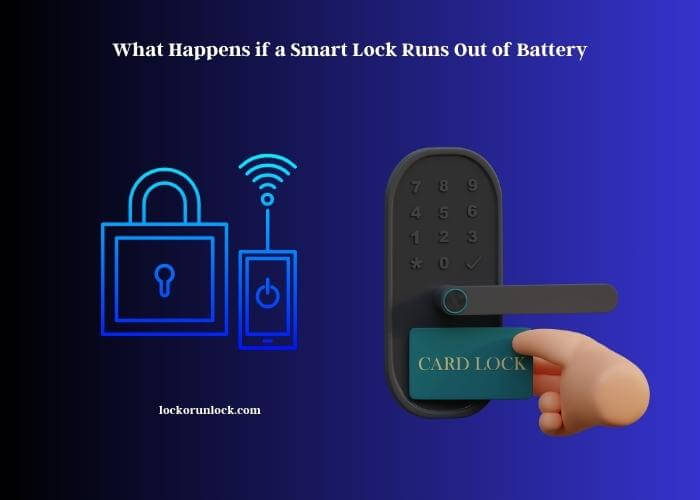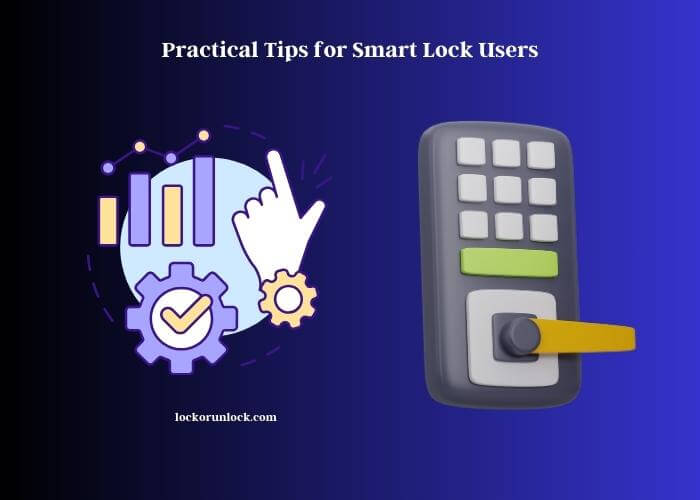If a smart lock runs out of battery, it ceases to function electronically. In such a scenario, users cannot access its smart features or remotely unlock it.
Smart locks are a modern convenience, offering enhanced security and ease of access. Yet, like all electronic devices, they rely on a power source. If the battery of a keyless entry door lock depletes, it can leave users in a tricky situation. For many brands, including Lockly and Yale, there are alternative methods to gain access. Often, these locks come with a physical key override, allowing users to open the electronic door lock without the keyless feature. This ensures that even if the battery is dead, residents aren’t locked out.

Battery replacement is a routine maintenance task for smart lock owners. Whether it’s a Lockly, Yale, August, or Level lock, it’s crucial to monitor the battery levels. Many of these devices provide notifications or indicators when the battery is critically low. This is a proactive measure to prevent unexpected lockouts. If an August smart lock battery dies or a Yale smart lock battery runs out, it’s a simple task to replace them. Always keep spare batteries on hand and familiarize yourself with the replacement process for your specific lock model. This way, you can ensure uninterrupted access to your home or property.
What Happens if a Smart Lock Runs Out of Battery?
The Basics of Smart Lock Operation
How smart locks function
Ever wonder how that little device on your door magically unlocks with just a touch or a voice command? It’s all thanks to the intricate technology within smart locks. These devices use a combination of wireless communication, sensors, and motors to operate. When you send a command via your smartphone or a key fob, the lock receives it and acts accordingly. It’s like having a tiny robot guarding your door!
The role of batteries in smart locks
Batteries are the unsung heroes of the smart lock world. Think of them as the heart pumping life into the device. Without them, the lock can’t communicate, can’t sense, and certainly can’t unlock. They provide the necessary juice to keep all the electronic components running smoothly. It’s like fuel for a car; without it, you’re not going anywhere.
The Immediate Aftermath of Battery Depletion
Loss of electronic functionality
Imagine you’re trying to start your car, but it just won’t budge. That’s what happens to a smart lock when its battery dies. The electronic components that make it “smart” go dormant. This means no more remote access, voice commands, or any other fancy features. It’s like your lock just took a step back in time!
Inability to access smart features or remote unlocking
Remember the days of manually unlocking doors with keys? Well, you might have to relive them if your smart lock’s battery dies. The advanced features that allow you to unlock your door from your phone or set temporary access codes for guests become unavailable. It’s akin to having a smartphone but only being able to make calls.
Manual Override Options
Using physical keys with electronic locks
It’s not all doom and gloom if your smart lock’s battery dies. Most manufacturers, being the forward-thinkers they are, have included a manual override option. This usually means there’s a hidden keyhole where you can use a traditional key to unlock the door. It’s like having a backup parachute when skydiving; you hope you never need it, but it’s good to know it’s there!
Built-in backup access methods
Some smart locks come with alternative backup methods, like pin pads or fingerprint scanners that have their own separate power source. So, even if the main battery dies, you can still get in. It’s like having a spare tire in your car; it might not be the main attraction, but it sure is handy in a pinch!
Brand-Specific Scenarios
Lockly: Battery replacement and backup methods
Lockly is a popular choice among smart lock enthusiasts. If its battery dies, not only can you use a physical key, but some models also offer a 9V battery terminal on the bottom. Just connect a 9V battery, and voila! Temporary power. It’s like having a portable charger for your phone.
Yale: Dealing with a dead battery and alternative access
Yale, a trusted name in the lock industry, has thought of everything. If the battery runs out, there’s always the trusty old keyhole. Plus, some models have a twist and turn mechanism that can be used with a coin or screwdriver. It’s like having multiple keys to the same treasure chest!
August: What to do if the battery dies
August smart locks are known for their sleek design and user-friendly interface. If the battery dies, you can still use the traditional key. Plus, the app often sends reminders to replace the battery before it’s too late. It’s like your lock has its own personal assistant!
Level Lock: Addressing critically low battery situations
Level Lock is all about innovation. If the battery gets critically low, the app sends you alerts. And if it does die? The hidden keyhole comes to the rescue. It’s like having a safety net while walking a tightrope.
Proactive Measures to Prevent Lockouts
Monitoring battery levels
Just like you keep an eye on your phone’s battery percentage, it’s wise to monitor your smart lock’s battery level. Many smart locks send notifications or even flash lights to indicate low battery. It’s like your lock is whispering, “Hey, I need a little pick-me-up!”
Setting up notifications or alerts for low battery
Many smart locks come with apps that allow you to set up notifications. This way, you’re always in the loop about your lock’s health. It’s like having a doctor on call, telling you when to take your vitamins.
Routine maintenance and battery replacement
Changing the batteries in your smart lock should be as routine as changing the oil in your car. Regular maintenance ensures longevity and optimal performance. It’s like giving your lock a spa day; it deserves some TLC!
Choosing the Right Batteries
Recommended battery types for longevity
Not all batteries are created equal. For smart locks, it’s best to go with alkaline or lithium batteries. They tend to last longer and provide consistent power. It’s like choosing premium fuel for your sports car; it just runs better!
The impact of battery quality on lock performance
Cheap batteries might save you a few bucks initially, but they can cost you in the long run. A good quality battery ensures your lock functions smoothly and reduces the risk of malfunctions. It’s like buying a good quality umbrella; it won’t let you down in a storm.
The Future of Smart Locks and Power Solutions
Innovations in battery life and alternative power sources
The future looks bright for smart locks. With advancements in battery technology and alternative power sources like solar, we might soon see locks that rarely, if ever, need a battery change. Imagine a lock powered by the sun or your touch!
The role of solar and kinetic energy in future smart locks
Harnessing renewable energy sources for smart locks is not a far-fetched idea. Solar panels or kinetic energy from door movements could be the next big thing. It’s like turning your dance moves into electricity; every move counts!
Practical Tips for Smart Lock Users

Keeping spare batteries on hand
It’s always a good idea to have a set of spare batteries in your home. This way, if your lock’s battery dies unexpectedly, you’re prepared. It’s like having an emergency chocolate stash; you never know when you’ll need it!
Familiarizing oneself with the lock’s user manual
Every smart lock is unique. By reading the user manual, you’ll know all the ins and outs of your device. It’s like getting to know a new friend; the more you know, the better the relationship.
Seeking professional assistance for complex issues
If all else fails, don’t hesitate to call in the experts. Sometimes, a professional touch is all you need to get things back on track. It’s like calling a plumber for that stubborn leak; they just know what to do.
FAQs
What Are the Immediate Effects of a Smart Lock Battery Depletion?
Once a smart lock’s battery is depleted, its electronic functionalities cease to operate. This means you can’t use features like remote access, voice commands, or any other advanced capabilities. Essentially, the lock becomes a regular, non-smart lock until the battery is replaced.
Can Trolling Motors with Spot Lock Impact Smart Lock Battery Depletion?
Trolling motors with spot lock technology can certainly impact smart lock battery depletion. By using spot lock technology, these motors are able to continuously adjust their power output to maintain a fixed position, which can contribute to increased battery usage during extended periods of use.
What are the impacts and solutions for a smart lock with a depleted battery?
The impacts of a smart lock with a depleted battery are inconvenience and compromised security. However, there are solutions for rusty lock that can help address this issue, such as using a backup mechanical key, setting up automatic battery alerts, or investing in a smart lock with long battery life.
Can I Still Access My Home If the Smart Lock Battery Dies?
Yes, most smart locks come with manual override options. This could be a traditional keyhole or alternative methods like pin pads or fingerprint scanners. Manufacturers recognize the importance of ensuring users aren’t locked out, so they often incorporate these backup methods.
How Do I Know When My Smart Lock Battery Is Low?
Many smart locks are designed to provide notifications or visual indicators when the battery is nearing depletion. This could be in the form of a flashing light on the lock or a notification on the associated mobile app. It’s a proactive measure to alert users before the battery completely runs out.
Are There Brand-Specific Solutions for Dead Batteries?
Yes, different brands offer unique solutions. For instance, Lockly provides a 9V battery terminal for temporary power, while Yale locks might have a twist and turn mechanism for manual access. It’s always a good idea to familiarize yourself with the features of your specific lock brand.
How Often Should I Replace My Smart Lock Battery?
The frequency of battery replacement depends on the lock’s usage and the battery type. However, as a general guideline, it’s wise to check the battery every 6-12 months. Some high-quality batteries can last up to a year or more, especially if the lock isn’t used frequently.
What Type of Battery Is Best for Smart Locks?
Alkaline or lithium batteries are typically recommended for smart locks. They provide consistent power and tend to have a longer lifespan compared to cheaper alternatives. Investing in good-quality batteries can ensure smoother lock performance and reduce the need for frequent replacements.
Can Future Smart Locks Avoid Battery Depletion Issues?
The future of smart locks is promising with innovations in battery technology and alternative power sources. There’s ongoing research into harnessing renewable energy, like solar or kinetic energy from door movements, which could drastically reduce or even eliminate the reliance on traditional batteries.
Navigating the world of smart locks can seem daunting, but with a little knowledge and preparation, you can enjoy the convenience they offer without any hiccups. Whether it’s choosing the right battery, understanding brand-specific features, or embracing future innovations, being informed is key. And remember, even in our high-tech world, sometimes the old-fashioned way (like using a physical key) can save the day!
